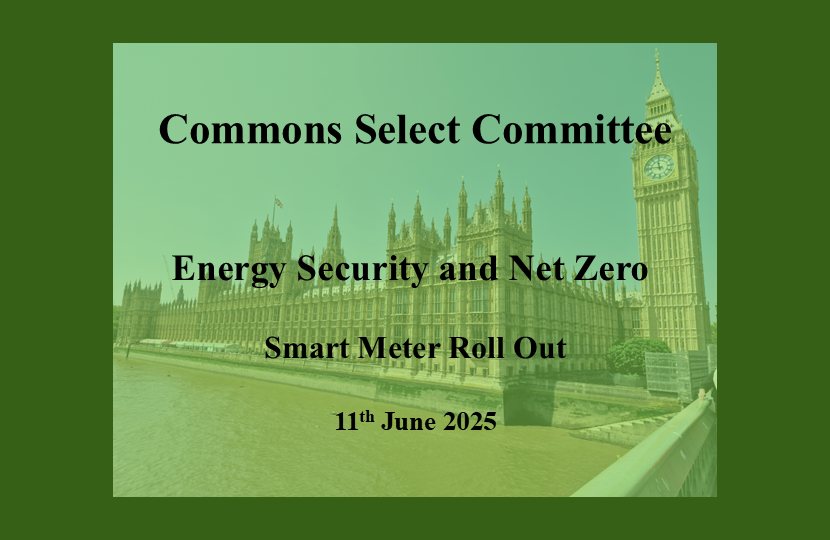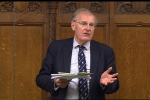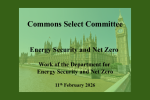
Chris Investigates Consumer Costs And Benefits Of Smart Meter Roll Outs
Q37 Sir Christopher Chope: I apologise for not being here at the beginning, but I have been at another Committee. I wanted to ask you about the costs and benefits. What are the costs in the current year of this smart meter roll-out?
Sara Higham: The Government are probably best placed to answer on the cost-benefit analysis. They do an annual report to Parliament, and the most recent one, which I think was published a couple of months ago, showed that net benefits are now in the range of £1.8 billion to the end of 2023. For the overall programme period, which goes out to 2034, you are looking at net benefits of £6 billion.
Q38 Sir Christopher Chope: That wasn’t quite my question, was it? My question was, what are the costs this year of the smart meter roll-out?
Sara Higham: I am afraid I do not know. Someone in Government would be best placed to answer.
Q39 Sir Christopher Chope: But who is paying for the cost of the smart meter roll-out?
Sara Higham: Ned might be best placed to answer, but as with any part of your metering system, it is something that will be passed through the bills.
Ned Hammond: It is added on to energy bills. At the moment, around £15 of the bill is on smart meters.
Q40 Sir Christopher Chope: About £50 of everybody’s energy bill is going on smart meter roll-out? That seems a heck of a lot of money.
Ned Hammond: I think the point you are trying to get to is about how costly it is to do this overall. What we have talked about previously is around what the future framework for the roll-out might look like. One of the challenges that suppliers have and one of the reasons that increases the costs of the roll-out at the moment is that DESNZ has set unrealistic installation targets for suppliers, which mean that they are basically forced into doing as much communications and giving as many incentives as possible for any customers who do not have a smart meter and are able to take one up, whether or not they are planning to use it for its purpose and get the benefits of it. We would like to see a future framework that focuses much more on making sure that those with smart meters get all the benefits they can from them and looks at incremental demand drivers to help the—
Q41 Sir Christopher Chope: So who is paying for these unrealistic targets, which you are complaining about and want rectified? If they are unrealistic targets, and they are costing every household on average £50—
Ned Hammond: £15.
Sir Christopher Chope: Sorry, I misheard. If they are costing every household on average £15 a year on a smart meter roll-out, that is unnecessarily high, isn’t it? Why isn’t the cost of the smart meter roll-out being borne by the industry, rather than being transferred to the consumer?
Ned Hammond: The important thing to note is that the benefits people can get from smart meters far outweigh that cost.
Q42 Sir Christopher Chope: There may be individual households that do not wish to have a smart meter, which is fine, but as they are not going to get any benefit, why should they pay the cost?
Ned Hammond: There are benefits to individuals who get involved. Anybody who has a time-of-use tariff can get benefits of at least £115 a year. It could be several hundreds of pounds a year, particularly if they have an electric vehicle.
Sir Christopher Chope: You are talking like a snake oil salesman, if I can say so. Why can’t you just answer the questions?
Ned Hammond: Even those who do not take it up will benefit from the smart meter roll-out. Because the roll-out enables demand flexibility, and because people who get a smart meter use less energy—it is typically 3% to 4% less energy consumption—the amount of peak power generation and network grid we need will be lower as well. That means there is a lower cost of the overall energy system, which means that even the people who do not get a smart meter can benefit from lower costs.
Q43 Sir Christopher Chope: You are describing a national benefit, but the cost of that is being borne by individual consumers, many of whom are complaining about the extent of the policy costs on their bills every month. Why is the national benefit, which you have been describing, not being borne by the national taxpayer?
Ned Hammond: It is worth noting that that national benefit is also a benefit on people’s energy bills, because the costs of developing the grid also get added to energy bills. If you can optimise that, you are reducing people’s energy bills. By having more smart meters and more demand flexibility, you are able to do that optimisation that reduces people’s costs. There is a benefit that people will get even if they do not get a smart meter.
Q44 Sir Christopher Chope: But in the meantime, irrespective of their income, people are paying extra—a policy levy—on their household bills, aren’t they, and businesses likewise?
Ned Hammond: As I have said, there is a cost on the bills, but there is also a benefit that both individuals with smart meters and all households get from the smart meter roll-out.
Q45 Sir Christopher Chope: Can we turn to the benefits? The original idea was that consumers and businesses would, by 2034, benefit to the extent of £19.5 billion as a result of the smart meter roll-out. Is that still the right figure?
Ned Hammond: That is the latest analysis that the Government did, but that was back in 2019. We expect that the benefits would actually be even higher now, because energy prices are higher, so the reductions in costs are higher in pound amounts as a result, but also because there has been a greater proliferation of low-carbon technologies that can benefit from the flexibility that smart meters can provide—heat pumps, electric vehicles, solar and batteries. It is possible that the benefits would be even greater.
Q46 Sir Christopher Chope: Why is it not possible to estimate that now? You are talking about a 2019 estimate; why can’t that be updated?
Ned Hammond: We are coming to the end of the Government’s current framework, which runs to 2025. We would like to see them do a new cost-benefit analysis of part of the new framework.
Q47 Sir Christopher Chope: Governments have continually pushed back the date for delivery on all this. Do you think that has added to the costs?
Ned Hammond: I would not have anything specific to add to what I have already said on that front.
Q48 Sir Christopher Chope: Do you think suppliers are adequately incentivised to minimise the costs of their smart meter roll-out while maintaining quality customer service?
Ned Hammond: As I have said already, we think the existing framework, which involves what we believe are unrealistic installation targets, adds to the costs of the roll-out. We would prefer to see a new framework that focuses more on maximising those benefits for customers compared with the costs.
Chair: We agreed that we would finish at 4 o’clock and we have reached 4 o’clock. Thank you to our first panel for your evidence this afternoon. We will take a short break while we change over panels.
-
Later in the same Select Committee Sitting.
Chair: Thank you very much. Chris Chope has some questions on cyber-security.
Q70 Sir Christopher Chope: These questions are based on research at Oregon State University, which says that smart meters are ideal targets for hackers because they provide a means for malicious actors to gain access to and destabilise the power transmission grid. Penny Brown, do you think that you are doing enough to guard against cyber-attacks?
Penny Brown: Our network is a private network. It is end-to-end encrypted. You cannot get access to our data or network unless you are certified: every user, whether it is an energy retailer or a device, has to have certification. It is all encrypted, very much like what Pil talked about from a Danish perspective.
We are very alive to threats. We are constantly looking at threat analysis; we monitor our network 24/7. We work with the National Cyber Security Centre as well: our design of the network was actually built with GCHQ. But we are never complacent. After the recent cyber-attacks that we have seen, certainly from our company’s perspective, we have been listening to what has gone wrong and building a threat analysis, as well as doing exercises with our own employees. We are always revising on a regular basis and keeping alive to the situation as new attacks happen and new information is sought.
Simon Elam: I am not a cyber-security expert, so the DCC is certainly in a much better place to comment than I am.
Sir Christopher Chope: What about Denmark?
Pil Krogh Tygesen: I am not a cyber-security expert either, but I agree that with the increasing digitisation of the energy sector there is a risk. With more geopolitical focus directed toward the energy sector, that is also definitely a risk.
As I mentioned, this is part of the general Danish legal framework for protecting data. It is also part of the general Danish cyber-security and threat resilience framework, which is a collaboration between the Government, the service providers and the companies involved. Will the risk ever be 100% eliminated? I am not sure that that would be a realistic thing to go for. The target is that all reasonable measures have been taken, and this is within the framework of the relevant authorities.
Q71 Sir Christopher Chope: Some individual consumers do not want smart meters because they are worried about various threats, of one sort or another, and they would like to be able to take responsibility for making their own judgments. As you have just said, that sort of cyber-threat cannot be eliminated 100%. In Denmark, do people have the freedom to opt out of smart meters for whatever reason, such as because they regard them as a threat to their own security? I have a parliamentary colleague, for example, who does not do emails for security reasons. Could he do the same thing in Denmark and not have a smart meter?
Pil Krogh Tygesen: I have not come across any examples of that sort of exemption in the Danish roll-out. My personal speculation would be that the grid-scale assets are a bit more vulnerable or more of a strategic asset than the individual smart meters, but as I say, I am not a cyber-security expert. That is just my own speculation.
Q72 Sir Christopher Chope: So there is no risk from hackers. We are pretty safe from hackers, are we?
Penny Brown: As Pil said, nothing is 100% invulnerable. Based on the design, the monitoring and the constant re-evaluation and rigour that we put in, we are in a good place, but we are always learning. Hackers are always coming up with new ways to penetrate anything, so we always have to keep alive to the risk.
Q73 Sir Christopher Chope: What about rogue installers? It is difficult to control the engineers who put in these meters. They are obviously trained and subject to some scrutiny, but they could be a weak link in the whole system, could they not?
Penny Brown: Because it is a private network, you would not be able to penetrate it from installing the meter directly. If there is a risk at all, it is more likely to be similar to the cyber-attacks that we see right now, with people coming in through employees, as opposed to through meter devices.
Q74 Sir Christopher Chope: Are there any other safety risks associated with smart meters?
Penny Brown: I am not a cyber or safety expert, but we can certainly give you more information on that afterwards, Sir Christopher.
- ENDS

